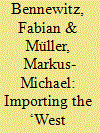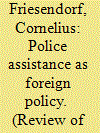| Srl | Item |
| 1 |
ID:
185069


|
|
|
|
|
| Summary/Abstract |
In analyzing West German police assistance for Costa Rica, we uncover the transnational dynamics of Cold War counterinsurgency policing during the Central American conflicts of the 1980s. We scrutinize West Germany’s engagements with Costa Rica, demonstrating how technical police assistance by the self-fashioned West German ‘civilian power’ fed into a wider counterinsurgency turn in Costa Rican policing. Highlighting the role of local agency and transnational context conditions, we point towards the interest of the Costa Rican government in reaching out to West Germany to demonstrate its neutrality within the ongoing conflicts while simultaneously bolstering the counterinsurgency capacities of its police forces.
|
|
|
|
|
|
|
|
|
|
|
|
|
|
|
|
| 2 |
ID:
144062


|
|
|
|
|
| Summary/Abstract |
Police assistance is an important, albeit understudied aspect of foreign policy. While many scholars have studied international and transnational policing, it remains largely unknown why donor police forces often support their colleagues in fragile states in different ways. This article discusses a variety of potential explanations of police assistance: a domestic rational actor model; a constructivist focus on international norms; and theories on the use of force by democracies. While all of these explanations are relevant, this article shows that they remain incomplete without studying police organisations and how these implement assistance on the ground. As the organisational cultures of donor police agencies differ, so do their assistance practices. The case of German and Italian police assistance in Afghanistan illustrates the relevance of an organisational approach: despite operating in the same environment, German police officers promoted civilian and Italian Carabinieri militarised policing. The article stresses that explaining security assistance, an important form of indirect intervention in fragile states, requires zooming in on policy implementation and policy implementers.
|
|
|
|
|
|
|
|
|
|
|
|
|
|
|
|